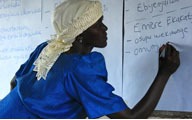
Transforming Subsistence Farmers into Viable Commercial Producers
In 2006, USAID awarded ACDI/VOCA a five-year $74 million Title II Multi-Year Assistance Program (MYAP) in Uganda. The program reduced food insecurity and increased nutrition awareness and best practices for vulnerable populations in northern and eastern Uganda. Targeted geographic areas included the Acholi, Lango and Teso subregions and the districts of Amuria, Amuru, Apac, Budaka, Bukadea, Dokolo, Gulu, Kaibermaido, Katakwi, Kitgum, Kumi, Lira, Oyam, Pader, and Soroti.
The project was an outgrowth of efforts that began in 1989 when ACDI/VOCA started managing a USAID-funded PL 480 Title II program in order to transform smallholder subsistence farmers into viable commercial producers through the introduction of modern farming techniques. Over the years, ACDI/VOCA has implemented seven other projects in Uganda and built on past successes in this project. Along with project partners Africare, Lutheran World Federation, The AIDS Support Organization (TASO), and local nongovernmental organization (NGO) grantees, ACDI/VOCA worked toward alleviating food insecurity in Uganda through two strategic project objectives:
- reduced food insecurity and increased nutrition status through better production and use of food by smallholder farmers
- reduced food insecurity and improved nutrition for particularly vulnerable people through the distribution of supplementary food rations
Smallholder Agriculture Component
The project awarded food security grants to local NGOs and community-based organizations (CBOs) and provided technical assistance and training of trainers (TOT) to local sub-grantees in nutrition and hygiene, agronomic methods, post-harvest handling, group savings mobilization and management, ACDI/VOCA’s signature Farming as a Business curriculum, collective marketing and natural resource management. The grantee trainers then spread the knowledge gained from the TOT sessions to beneficiary farmers. Over the life of project, the project trained a total of 76,392 smallholder farmers.
The core nutrition training module helped farming households make informed decisions about nutritious foods to increase the frequency and nutritional value of household meals as well as meet any special nutritional needs for household members. Subsequent trainings introduced beneficiaries to improved farming techniques, financial management guidance and simple business practices to maximize the production and marketing potential of their farms. In addition, the project strengthened community and household capacity to withstand future challenges by providing training support to farmer savings groups. By the end of fiscal year 2012, approximately 63,594 farmers, over half of whom were women, had received technical trainings to increase their food security and resiliency to future shocks. In addition, farmer groups had accumulated approximately $428,846 in group savings by the end of 2012.
Working with Africare and local private subcontractors, ACDI/VOCA improved transportation infrastructure through the rehabilitation of feeder roads to increase access to local and regional markets, schools and health facilities. The improved roads help farmers distribute their products more efficiently and provide increased access to services. The project rehabilitated 249 km of road in the districts of Budaka, Bukedea, Dokolo, Kumi, Lira, and Soroti, benefitting 309,400 people. A post-rehabilitation survey in Lira found that access to markets had improved for 99 percent of households in the affected areas.
Food Distribution Component
ACDI/VOCA and project partner TASO provided services to approximately 127,016 beneficiaries through a food distribution program to people living with HIV (PLHIV) and their families. PLHIV beneficiaries in targeted areas who were TASO clients and deemed food insecure received rations of nutritious and high-calorie corn soy blend (CSB) and vegetable oil. Food-insecure clients who were on anti-retroviral treatment were prioritized as food recipients. TASO provided complementary treatment, counseling and care to the PLHIV food aid beneficiaries. ACDI/VOCA staff arranged logistics, conducted the distributions, assured beneficiary eligibility, and monitored and evaluated the overall program. In FY 2011, the final year of food distribution activities, nutrient-rich rations were distributed to 46,523 beneficiaries on a monthly basis. In addition, in 2011 ACDI/VOCA conducted 121 cooking demonstrations at food distribution points to show beneficiaries how to incorporate CSB and vegetable oil into traditional meals.
To ensure sustainability after the food distribution ended, selected PLHIV beneficiaries were integrated into agricultural or income-generating activities conducted by the project, thereby increasing their ability to sustain long-term food security. In 2012, the project supported ten groups of former food aid beneficiaries, aided them in creating business plans, and awarded in-kind grants to help the groups jump start their businesses. These in-kind grants included items such as improved seeds, maize grinding mills, and broiler chicks.
Monetization and Logistics
Monetization is the sale of donated U.S. commodities in a foreign country to generate funds for development activities. Under the PL 480 program, ACDI/VOCA sold hard red winter wheat through a competitive tendering process to local buyers. ACDI/VOCA has also been the lead partner in the Uganda umbrella monetization consortium and has organized the movement and sale of all Title II PVO monetization commodities throughout the year. The coordinated wheat sales have brought maximum proceeds for partners, minimized impact on the local market and promoted the development of local mills.
In addition to the monetization of wheat, ACDI/VOCA also managed the logistics of commodities distributed to program beneficiaries. Commodities were transported from ACDI/VOCA’s main warehouse in Kampala to three regional warehouses in Lira, Soroti and Gulu districts before being taken to final distribution points for delivery to beneficiaries.





